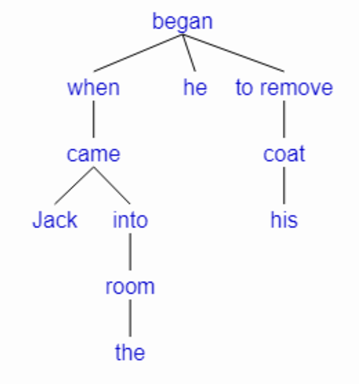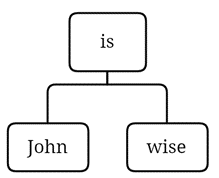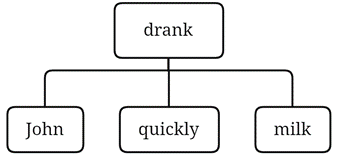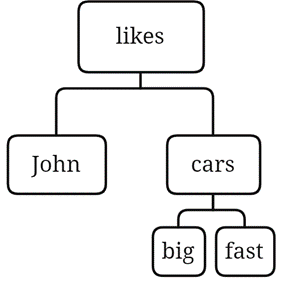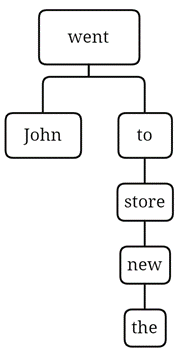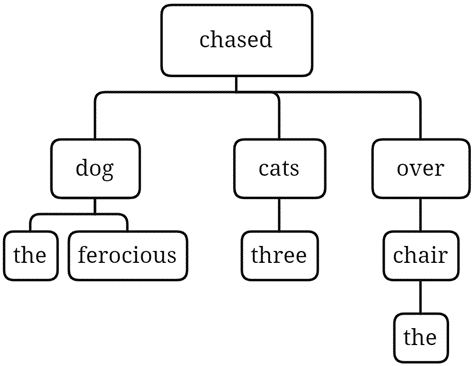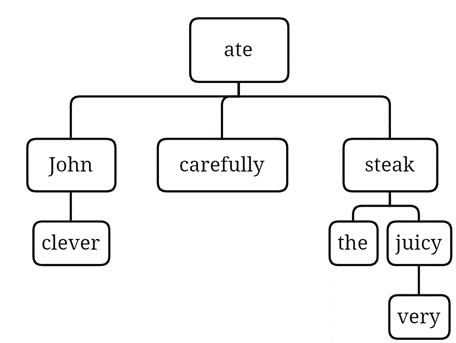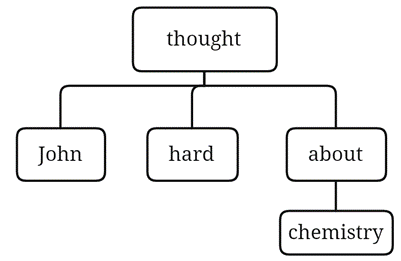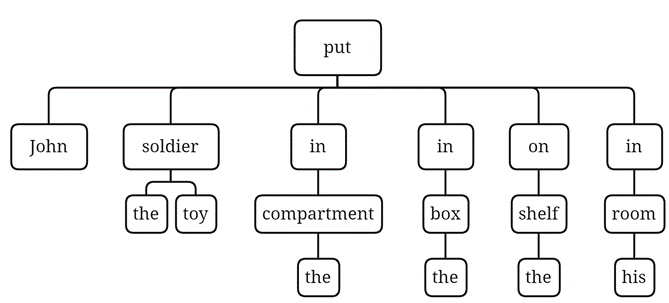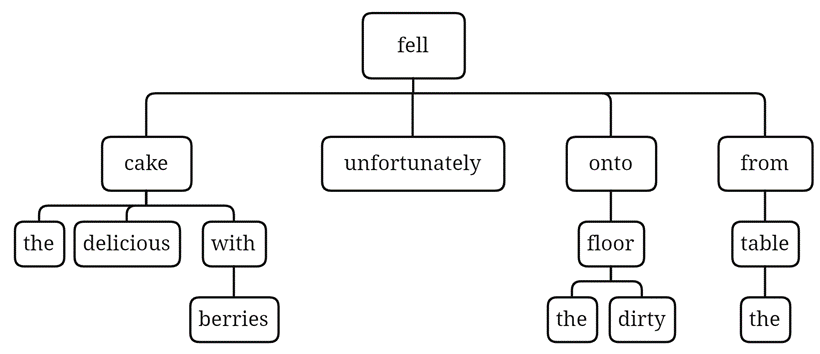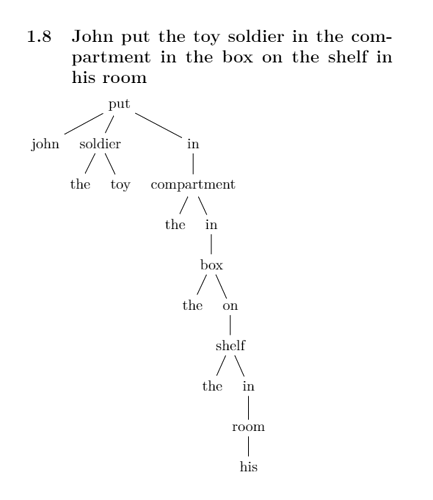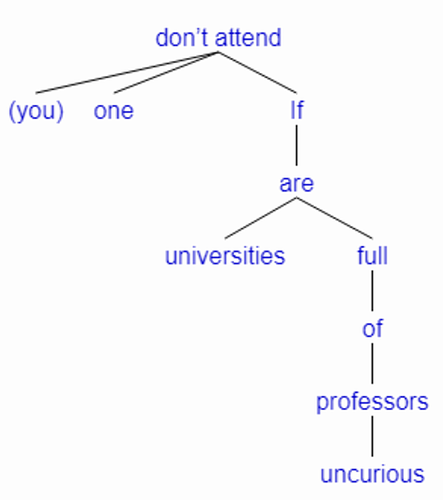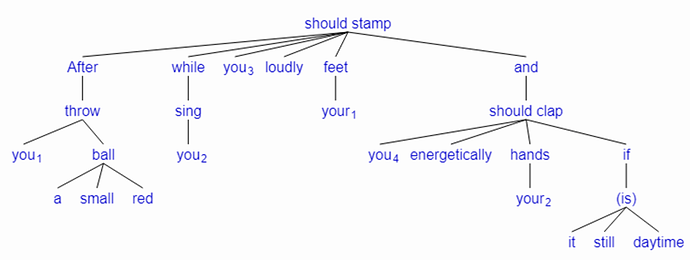- I work hard and I play hard.
Main clause: I work hard.
Action Verb: work.
Subject: I.
‘Hard’ modifies ‘work’ (adverb).
Coordinating conjunction: and.
Coordinate clause: I play hard.
Action verb: play.
Subject: I.
‘Hard’ modifies ‘play’ (adverb).
S-Expression: [work [I] [hard] [and [play I [hard]]]]
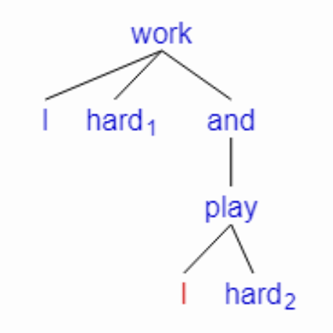
- Farting or belching is mildly impolite.
Linking verb: is
Subject: farting or belching.
Subject complement: impolite.
‘Mildly’ modifies ‘impolite’.
S-Expression: [is [“Farting or belching”] [impolite [mildly]]]
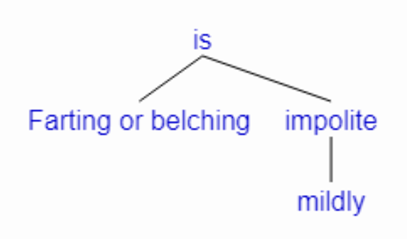
- I went to a fancy university, yet I’m still quite ignorant.
Main clause: I went to a fancy university.
Action verb: went.
Subject: I.
Prepositional phrase: to a fancy university. The phrase functions as an adverb, modifying ‘went’. The preposition is ‘to’ and it governs the noun ‘university’. ‘A’ is an adjective, modifying ‘university’. ‘Fancy’ is an adjective, modifying ‘university’.
Coordinating conjunction: yet.
Coordinate clause: I’m still quite ignorant.
Linking verb: am.
Subject: I.
Subject complement: ignorant.
‘Still’ modifies ‘am’ (adverb).
‘Quite’ modifies ‘ignorant’ (adjective).
S-Expression: [went [I] [to [university [a] [fancy]]] [yet [(am) [I] [still] [ignorant [quite]]]]]
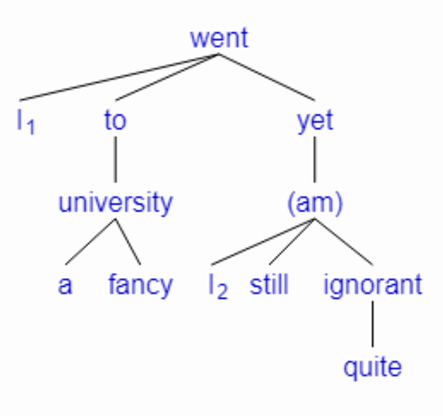
- I write because I like good ideas.
Main clause: I write.
Action verb: write.
Subject: I.
Subordinating conjunction: because.
Subordinate clause: I like good ideas.
Action verb: like.
Subject: I.
Object: ideas.
‘Good’ modifies ‘ideas’ (adjective).
S-Expression: [write [I] [because [like [I] [ideas [good]]]]]
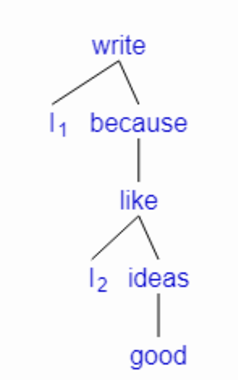
- The bully hit my buddy and me pretty hard.
Action verb: hit.
Subject: bully.
Object: buddy and me.
‘The’ modifies ‘bully’ (adjective).
‘My’ modifies ‘buddy’ (adjective).
‘Pretty’ modifies ‘hard’ (adverb).
‘Hard’ modifies ‘hit’ (adverb).
S-Expression: [hit [bully [The]] [“buddy and me” [my]] [hard [pretty]]]
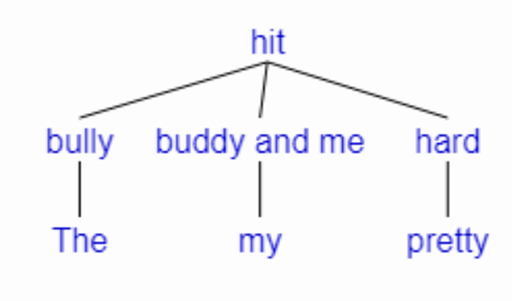
- I seriously think that Ayn Rand was wise.
Main clause: I seriously think.
Action verb: think.
Subject: I.
‘Seriously’ modifies ‘think’ (adverb).
Subordinating conjunction: that.
Subordinate clause: Ayn Rand was wise.
Linking verb: was.
Subject: Ayn Rand.
Subject complement: wise.
S-Expression: [think [I] [seriously] [that [was [“Ayn Rand”] [wise]]]]
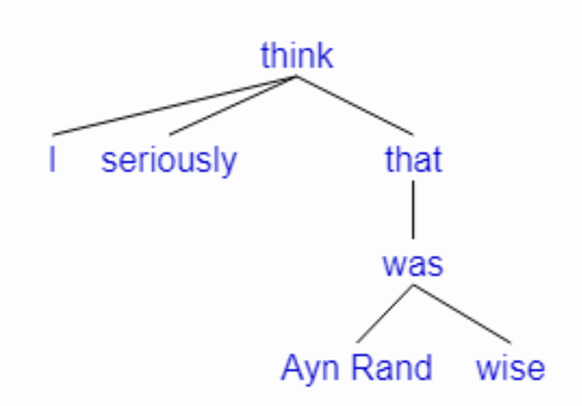
- Don’t chew quickly while your mouth is open.
Main clause: Don’t chew quickly.
Action verb: don’t chew (imperative).
Subject: (implied) You.
‘Quickly’ modifies ‘chew’ (adverb).
Subordinating conjunction: while.
Subordinate clause: your mouth is open.
Linking verb: is
Subject: mouth.
Subject complement: open.
‘Your’ modifies ‘mouth’ (adjective).
S-Expression: [“Don’t chew” [(you)] [quickly] [while [is [mouth [your]] [open]]]]
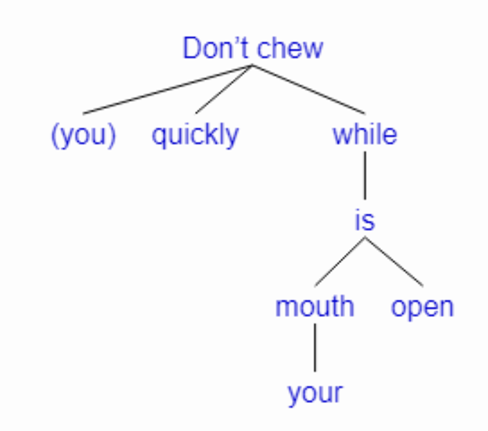
- My daughter likes big dogs, but my son likes adorable cats.
Main clause: my daughter likes big dogs.
Action verb: likes.
Subject: daughter.
Object: dogs.
‘My’ modifies ‘daughter’ (adjective).
‘Big’ modifies ‘dogs’ (adjective).
Coordinating conjunction: but
Coordinate clause: my son likes adorable cats.
Action verb: likes.
Subject: son.
Object: cats.
‘My’ modifies ‘son’ (adjective).
‘Adorable’ modifies ‘cats’ (adjective).
S-Expression: [likes [daughter [My]] [dogs [big]] [but [likes [son [my]] [cats [adorable]]]]]
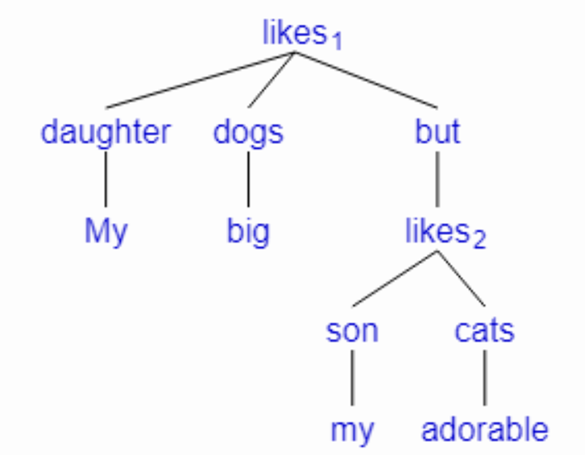
- If universities are full of uncurious professors, don’t attend one.
Main clause: don’t attend one.
Action verb: don’t attend (imperative).
Subject: You (implied).
Object: one.
Subordinating conjunction: if.
Subordinate clause: universities are full of uncurious professors.
Linking verb: are.
Subject: universities.
Subject complement: full.
Prepositional phrase: of uncurious professors. The phrase functions as an adverb, modifying ‘full’. The preposition is ‘of’ and it governs the noun ‘professors’. ‘Uncurious’ is an adjective, modifying ‘professors’.
S-Expression: [“don’t attend” [(you)] [one] [If [are [universities] [full [of [professors [uncurious]]]]]]]
- After you throw a small, red ball, while you sing, you should stamp your feet loudly, and you should clap your hands energetically, if it’s still daytime.
Main clause: you should stamp your feet loudly.
Action verb: should stamp.
Subject: you.
Object: feet.
‘Your’ modifies ‘feet’ (adjective).
‘Loudly’ modifies ‘stamp’ (adverb).
Subordinating conjunction: after.
Subordinate clause: you throw a small, red ball
Action verb: throw.
Subject: you.
Object: ball.
‘A’ modifies ‘ball’ (adjective).
‘Small’ modifies ‘ball’ (adjective).
‘Red’ modifies ‘ball’ (adjective).
Subordinating conjunction: while.
Subordinate clause: you sing.
Action verb: sing.
Subject: you.
Coordinating conjunction: and.
Coordinate clause: you should clap your hands energetically.
Action verb: should clap.
Subject: you.
Object: hands.
‘Your’ modifies ‘hands’ (adjective).
‘Energetically’ modifies ‘clap’ (adverb).
Subordinating conjunction: if.
Subordinate clause: it’s still daytime
Linking verb: is.
Subject: it.
Subject complement: daytime.
‘Still’ modifies ‘is’ (adverb).
S-Expression: [“should stamp” [After [throw [you] [ball [a] [small] [red]]]] [while [sing [you]]] [you] [loudly] [feet [your]][and [“should clap” [you] [energetically][hands [your] ] [if [(is) [it] [still] [daytime]]]]]]
From Peikoff Grammar Homework:
- When Jack came into the room, he began to remove his coat.
Main clause: he began to remove his coat.
Action verb: began.
Subject: he.
Object: to remove his coat. This is an infinitive phrase functioning as an object. The infinitive is ‘to remove’. ‘His’ is an adjective, modifying ‘coat’. ‘Coat’ is the object of the infinitive phrase.
Subordinating conjunction: when.
Subordinate clause: Jack came into the room.
Action verb: came.
Subject: Jack.
Prepositional phrase: into the room. The phrase functions as an adverb, modifying ‘came’. The preposition is ‘into’ and it governs the noun ‘room’. ‘The’ is an adjective, modifying ‘room’.
S-Expression: [began [when [came[Jack][into [room [the]]]]] [he][“to remove” [coat [his]]]]
